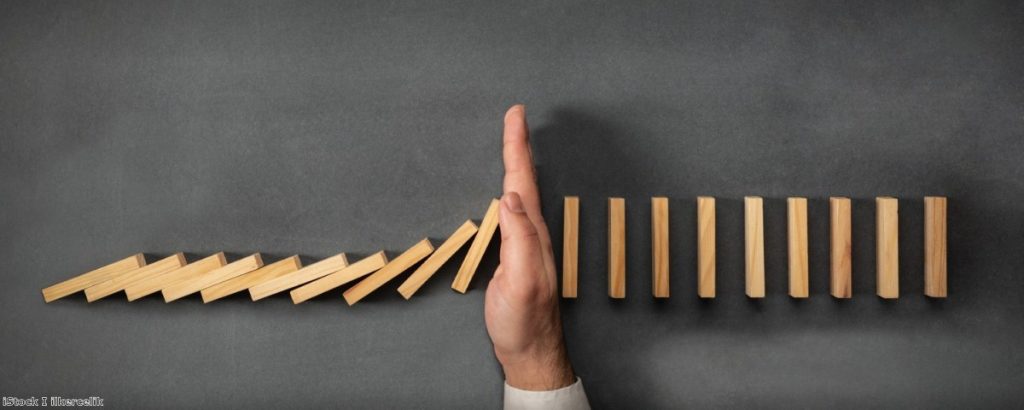Two good things came from the election result. You had to search for them in the great expanse of despair in which we found ourselves, but they were there.
First, it forced Labour to change its leader. That is an unalloyed good. All of the candidates are better than Jeremy Corbyn. Even Rebecca Long-Bailey, who has really very little to recommend her, would be a significant improvement.
Second, it meant that the Brexiters finally have to own their project. They have a massive majority. The withdrawal agreement bill zoomed through its Commons stages this week. There's no more Leavers vs Remainers, no more parliament vs government. They're in control. And that means this is all on them.
The great crushing reality of the trade talks will now take over. The warnings we've made over the last three years are about to be actualised.


The government could have taken its significant new majority as an opportunity to finally tell the truth about what this would entail. That it would take a long time. That it would involve painful trade offs. But even saying that out loud seems laughable. Of course, they continued with the relentless lies. Because that is all, in the end, that allows this project to proceed.
They say it can all be done in a year. It cannot. Even if the trade talks themselves can be finished in a year, which is unlikely, the ratification and implementation will take longer.
They say there will be no checks between Northern Ireland and Britain. There will be. It is quite clear from the agreed text and the realities of trade. But to admit this would be to concede that instead of securing a brilliant deal, as Boris Johnson claimed, he actually just capitulated to a deal which even Theresa May thought was intolerable.
They say they want to close off EU access to our fishing waters. But if they do this, the EU will reciprocate by putting up barriers to our ability to sell our fish into their market. It's not liberation. It's the last scene of Reservoir Dogs.
They say they want no regulatory alignment with the EU. If so the relationship will be punishingly distant and bureaucratic for British exporters. Modern trade functions on the basis of alignment, whoever you are trading with. The EU is simply much more sophisticated, and of course much closer, than other markets.
They say they won't reduce food standards in the event of a deal with the US. They will, or the deal will be without any substance whatsoever.
This is the reality of what will happen. The real world of trade-offs rather than the unicorn ecosystem of simple slogans and gibbering cynical nonsense.
It couldn't take place at a worse time. Remainers are bruised. Years of campaigning only to be totally defeated. Years of trying to highlight the national interest and the reality of the threats that face us, only for the election to deliver a firm result for infantile simplification and outright deception.
The temptation is to look away. To just ignore it all for a while. To get lost in things that make us feel better. To not watch the news. But that hands them control of the narrative just when it is at its most malleable.
When things start going wrong, and the trade-offs impinge on the fairy tale, they will blame the EU. They will say it is intransigent or unimaginative or arrogant.
It'll be false. The failures will be a result of strategising on the basis of myth rather than reality, of failing to accept the limitations of the world and working around them, of plotting your military movements over a map of Narnia.
The crucial task now is to objectively report on the reality of what is happening. To deny them the opportunity of creating another made-up story.
There will be damage from these decisions. That's why Remainers have opposed them. The wealthy will be fine. They always are. But the poor will be hurt. And they will include those former Labour voters in northern towns who lent Johnson their vote.
We cannot stop that damage now. We tried and we failed. We can urge the government to limit it by going back on its commitments, but there is little chance of them doing so. So instead, at the least – at the very bitter painful least – we can point out why it is happening. We can tell the truth.
This is a precondition of a successful campaign to rejoin in ten years or so: making sure that people see that the decline in their living standards is the result of Brexit.
But it is also something else. It is its own kind of rearguard moral defence. Because when the Brexiters' dream turn to ash, they will blame everyone but themselves. They will blame the EU. And they will blame immigrants. And in a period of declining prosperity, they will push a narrative of division against the weakest people in society.
The best way to fight that is to make sure they can't wriggle out of it now. To set the narrative in fact. We have to make them own it. Fully, completely and without caveat.
Ian Dunt is editor of Politics.co.uk. His new book, How To Be A Liberal, is out in spring 2020.
The opinions in Politics.co.uk's Comment and Analysis section are those of the author and are no reflection of the views of the website or its owners.

